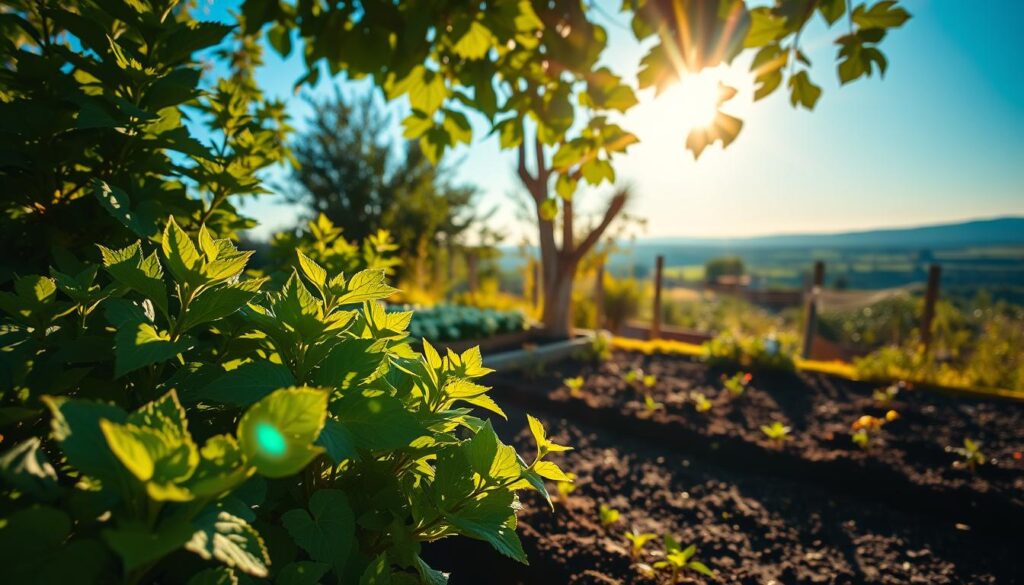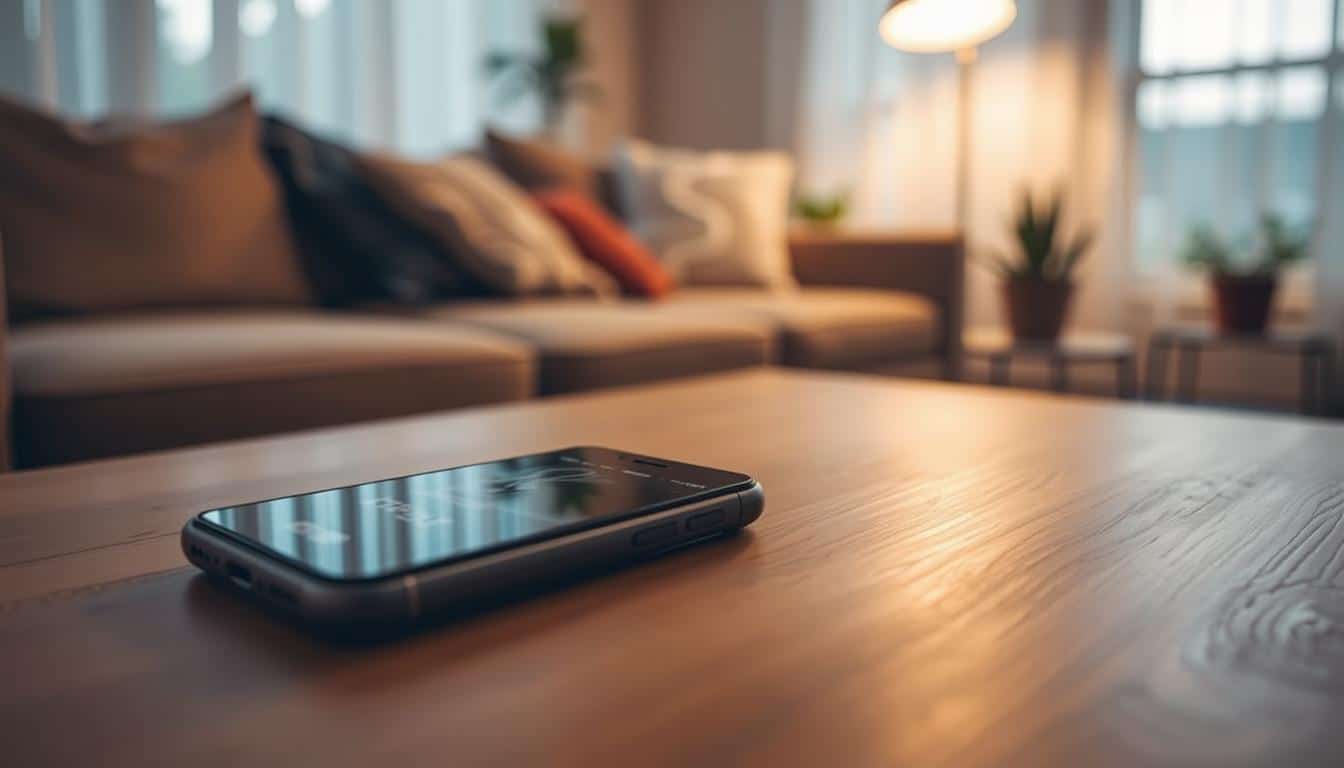Starting your gardening journey can be fun but also a bit scary. With some easy gardening tips, you’ll grow a green thumb quickly. This part will show you simple beginner gardening ways to make things better and more fun. Whether you’re interested in practical tips or just the good vibes from plants, you’ve come to the right spot.

Seek App
Let’s see how you can begin your garden easily and enjoy the fruits of your labor!
Anúncios
Find the Sunniest Spot for Your Garden
Finding the perfect spot for your garden is super important. Most plants that we eat need lots of sunlight, at least six hours daily. For new gardeners, there are easy tips to pick the best spot outside.
Start by watching the sunlight in your garden area during the day. Look at how long each part stays sunny and watch for shadows from trees or buildings. Knowing where the sunniest part is, makes sure your plants get enough light.
Anúncios
If there’s not enough sun in your yard, think about joining a community garden. These spots usually get plenty of sunlight and it’s a fun way to meet other people who love gardening.

Make a Watering Plan to Ensure Healthy Plants
Making sure your plants get enough water is key to keeping them healthy, especially when you can’t rely on rain. To keep your garden thriving, set up a regular watering schedule that fits the needs of your plants. For small pots, you’ll need to water by hand. But for bigger areas, a hose or soaker hose can water the roots well.
Water your plants early in the morning or late in the evening. Doing this stops water from evaporating too fast and lets it soak into the ground better. It also keeps plant leaves from getting burned by the sun if they’re watered in the middle of the day.
Here are some helpful garden watering tips:
- Check soil moisture before watering, ensuring plants truly need it.
- Deep watering encourages healthier root growth.
- Adjust your watering frequency based on seasonal changes.
Professionally Test Your Soil for Best Results
Before planting, testing your soil is key. It helps you know its quality. Knowing what nutrients and the pH level your soil has is crucial for your garden to thrive. Most local groups that help gardeners provide this test for about $30. This way, you get precise info on what your soil needs.
Using just home test kits might not give you the full picture. This could harm your plants. Getting a thorough check of your soil’s traits helps. Then, you can precisely give your garden what it needs, without wasting on things it doesn’t.
Start Small to Build Your Gardening Confidence
Starting small in gardening is essential for new gardeners. It helps them develop confidence and skills. By choosing a small garden, individuals won’t feel overwhelmed.
Having a few containers or a tiny plot is a great way to learn. Beginners can focus on these without too much pressure.
Here are some tips for new gardeners:
- Choose easy-to-grow plants that thrive in your local environment.
- Practice regular maintenance, including weeding and watering.
- Monitor the weather to protect young plants from harsh conditions.
A small garden makes goals clear and brings a sense of achievement. It encourages success through simplicity. As you get better and more confident, you might want to grow your garden bigger. And that can be very exciting.
No Plots? Discover the Benefits of Container Gardening
Container gardening is perfect for people who don’t have good soil or much space. This method lets gardeners grow a variety of plants in pots. It’s great for spots like patios or balconies where the sun shines just right.
Growing plants in pots does more than just save space. It warms up the soil, which helps plants grow better. Even if you’re new to gardening, you can have a great harvest with vegetables meant for pots. Pots make it easier to deal with bugs and control how much water your plants get.
Grow What You’ll Eat for Maximum Enjoyment
When you start out growing food, pick the veggies you love eating the most. This way, gardening becomes more than just a hobby; it turns into a rewarding part of your healthy lifestyle. Plus, there’s a special joy in cooking with veggies you’ve grown yourself.
Here are some tips for your garden plan:
- Go for plants that are rare in stores. This makes gardening extra special.
- Choose your favorites that match your taste and what you like to cook. This way, you’ll definitely enjoy the fruits of your labor.
- Try growing new veggies. Gardening is a great adventure in discovering new tastes and textures.
Buy Reliable Seeds and Plants for Success
When you start gardening, choosing quality seeds is key for great results. Buy seeds and plants from known companies like Burpee, Ferry-Morse, or Johnny’s Selected Seeds. These brands guarantee seeds that will grow and strong plants. Sometimes, cheaper seeds don’t do well and can lead to poor crops.
Local nurseries are also great for finding trustworthy plants. They have plants that will grow well in your area’s weather and soil. It’s important to know the best places to get your gardening supplies.
Plant Both Seeds and Seedlings for Variety
Starting a garden involves picking how you’ll grow your plants. Planting seeds directly is affordable and lets you grow many plants from the beginning. It’s especially good for easy plants like beans and herbs, which do well planted straight in your garden.
But, for plants that take longer to grow, like tomatoes and peppers, seedlings are better. Starting with seedlings means you’ll see your veggies grow faster. By using both methods, your garden will have more types of plants and bigger harvests.
Inspect Your Garden Often for Quick Problem-Solving
Checking your garden often is key to keeping it healthy and vibrant. New gardeners should get into the habit of observing their plants closely. This helps spot pests and diseases early on.
Learning about common garden problems allows you to act fast. This quick action protects the friendly bugs that help your garden. Besides looking, monitor your plants’ health in other ways too. It’s also a good idea to talk to local garden experts for advice on pests and diseases.
Make checking your garden a regular part of your routine. This way, you can enjoy its beauty and bounty without nasty surprises.
Plant Flowers to Attract Pollinators and Beneficial Bugs
Adding flowers to your vegetable garden makes it look better and helps with pollination. Marigolds, borage, and sweet alyssum are great for drawing in helpful bugs. These insects keep pests away and improve pollination.
When you plant these flowers, you enable a healthier garden. This attracts bees and other pollinators, leading to more fruits and veggies. A colorful garden also brings in different friendly insects, which helps your garden flourish.
- Marigolds: Known for repelling harmful pests while attracting pollinators.
- Borage: Its star-shaped flowers are particularly appealing to bees.
- Sweet Alyssum: Offers a nectar-rich source that attracts a variety of beneficial insects.
Choosing the right flowers for your garden can boost your pollination efforts. This makes your garden healthier and more productive.
Conclusion
In this gardening conclusion, we covered important tips for beginners. Choosing a sunny spot and planning how to water your plants are key. These steps help your garden grow well.
Patience and hard work are very important for your garden to thrive. It takes time, but it’s worth it.
Choosing the right seeds and plants, testing the soil, and checking your garden often can really make a difference. These steps will make your garden beautiful and your gardening more enjoyable.
Starting your gardening journey is exciting. Follow the advice we talked about, and you’ll grow a beautiful garden. You’ll be proud of what you’ve achieved.



